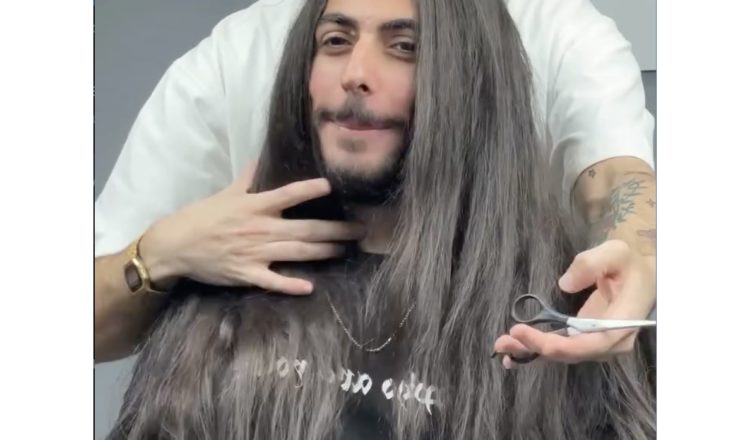For as long as he could remember, Alex had been defined—at least in part—by his hair. It started as a childhood quirk. His mother loved his soft, honey-brown locks and resisted the neighborhood barbers who urged her to cut it short. “It’s beautiful,” she would say. “Why take away something that makes him unique?” As Alex grew, the locks became longer, cascading down his shoulders in gentle waves. People often stopped to admire them, unaware of the complicated feelings behind his polite smile.
By his teenage years, Alex’s hair had become his trademark. Friends teased him good-naturedly, calling him “rock star” or “prince.” But strangers weren’t always as kind. “Miss, could you step aside?” a store clerk once said. Another time at a café, someone tapped him on the shoulder with a bright, “Excuse me, ma’am,” only to stammer an apology when he turned around. At first, he brushed it off. Being different wasn’t the worst thing, he reasoned. It even gave him a kind of mystique.
But over time, the confusion started to wear on him. Job interviews came with extra-long stares. At a cousin’s wedding, a distant relative made a comment about “boys trying to be girls these days,” and though Alex knew it wasn’t meant for him specifically, it still stung. It wasn’t about conforming—it was about being seen for who he truly was. And increasingly, Alex wasn’t sure his hair reflected that anymore.
Despite the doubts, he held onto the long locks into his twenties. There was a strange comfort in them. They made him feel safe, like he was hiding behind a curtain that shielded him from the world. But then came the afternoon that changed everything.
He was walking home from work when a group of children ran past him, laughing. One of them pointed and whispered something to his friend, and though Alex couldn’t hear the exact words, their giggles made his stomach twist. He realized he was tired—tired of being a question mark to strangers, tired of second-guessing every glance. That night, he stood in front of his bathroom mirror and held up his hair in a ponytail. He imagined his face without it, more open, more defined. For the first time, he felt a spark of excitement instead of fear.
The following Saturday, Alex made an appointment at a barbershop downtown. The place had a reputation for transformative cuts, and something inside him whispered it was time. When he walked in, the hum of clippers and low murmur of conversation filled the air. A barber with a friendly grin approached. “First time here?” he asked.
Alex nodded, sliding into the chair. “I want… a change,” he admitted. “Something big. I’ve had long hair my whole life.”
The barber’s eyebrows lifted. “Ready to lose it?”
“More than ready,” Alex said, though his jittery legs betrayed a mix of nerves and anticipation.
The barber draped a cape around him and combed through the long waves. “You’ve got great hair,” he said. “But I promise you, we’ll make you look sharp.”
With the first snip, Alex felt an unexpected rush of emotion. It wasn’t sadness, exactly—it was relief. Years of uncertainty and mixed feelings seemed to slide off with each lock. The barber worked methodically, cutting inches, then shaping the rest into something fresh. Alex caught glimpses of himself in the mirror as his face gradually emerged from behind the curtain of hair. His jawline looked stronger. His eyes seemed brighter. He hardly recognized himself, but in the best way possible.
By the time the barber was done, Alex was speechless. The man in the mirror looked confident, defined, and—most importantly—comfortable in his own skin. He ran a hand over the short style and laughed. “I can’t believe that’s me,” he said.
“Sometimes a haircut isn’t just a haircut,” the barber replied with a smile. “Sometimes it’s a reset.”
When Alex stepped outside, the cool breeze felt different against the back of his neck. People passed by without double-takes or awkward confusion. For the first time in years, he felt invisible in the best sense—no longer a curiosity, just himself.
As the days passed, the change extended beyond the physical. He felt more confident speaking up at work. He reconnected with old friends who remarked on how happy he seemed. Even his posture improved; there was no more hiding behind his hair. The world hadn’t changed, but his perspective had.
A week later, Alex visited his parents for dinner. His mother gasped when she saw him. “Your beautiful hair!” she cried instinctively, reaching out to touch the shorter strands. Then she smiled, her eyes softening. “You look so handsome, Alex. And so grown up.”
He hugged her. “It was time,” he said simply.
That night, as he got ready for bed, Alex stared at his reflection one more time. This time, he didn’t see the long-haired boy people mistook for someone else. He saw himself—no apologies, no confusion. Cutting his hair hadn’t solved all of life’s problems, but it unlocked something inside him: the courage to embrace change and define himself on his own terms.
Years from now, Alex would look back on that afternoon in the barbershop as the day he started living more authentically. It wasn’t about the compliments or the ease of getting ready in the morning—it was about that moment of decision, sitting in the chair, choosing to let go of what no longer fit.
Sometimes transformation isn’t about becoming someone new, he realized. It’s about finally letting the world see who you’ve been all along.
